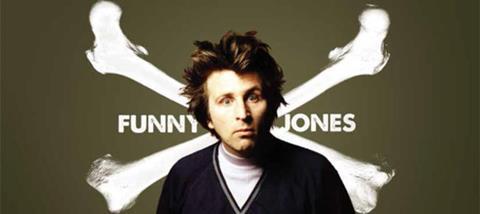
Comedian Milton Jones is known and loved for his witty one-liners. On the release of his new book – Ten Second Sermons – he chatted to Youthwork’s Jamie Cutteridge.
YW You’ve just released another collection of Ten Second Sermons. What was the inspiration behind writing these books?
MJ There is a line in there which says, ‘Should Christian artists just produce Christian art?’ Answer: ‘Should Christian bakers just produce hot cross buns?’ And if you like, these books are my hot cross buns. I’ve got a bigger canon of work, nothing to do with the Church, but this is just what I’m thinking about at the moment and I am the audience really. It’s me having thought about a subject and then trying to get it down to the art form that I use.
YW Have you ever done any kind of preaching or any sermons in a church context? MJ Sort of. I’m not sure in the strict sense that you’d call them sermons because they tend to be full of pictures, oneliners and drawings. I find that I can’t really keep to the normal sermon format. It’s not something that I’m used to. When I have preached, people come up to me after and say: ‘Oooh, that was different’. I’m not quite sure what they mean by that. I guess I keep trying to arrest people all the time with what I’m doing. And that may not work in church because the aim is entirely different. I’m employed to make people laugh, whereas laughing isn’t necessarily a good thing in itself in a church context. It could be good, but it’s only a physical reaction. One of the great things about not being in any kind of church leadership is that I’ve got a free role and I can spout off stuff and run away without having to take any responsibility.
YW Do you think the Church gets its communication right?
MJ I can only generalise from what I’ve seen. All I do know is that some people really have a gift and some really don’t. Sometimes the wrong people are in the wrong place. I guess it might come down to feedback, even from those around them, not necessarily just the audience…You know, ‘you’re not so good at that’, or whatever it is…People need to play to their strengths. I think Christian audiences are often far too nice, probably because they’re such a weird mixture of people not quite sure how to behave. It would be good for communicators to maybe have to, I don’t know, get up at Speaker’s Corner for example. Even just interacting with the audience a bit would be good, or saying, ‘If anyone has got a question, put your hand up.’ It’s amazing what comes up, you know, when someone does a talk and then asks for questions; often the questions and answers are far better than the talk.

It’s a fine line between that and having gimmicks for the sake of gimmicks. There’s another line in the book: ‘Christians are against the cult of celebrity until a celebrity becomes a Christian and then they want them to speak at all their meetings.’ There’s a real danger of the Church just following the latest fad or latest person who has stood up and said that they are a Christian…and then the person wishes they hadn’t because they’re invited to every Alpha supper from here to the end of eternity. I think, actually, people are spoken to best of all by people like them. And, equally true, if you wheel in a Christian rugby player or something you might engage a few people, but might cause unseen damage to the rugby player who possibly shouldn’t be speaking. What are we saying exactly? It’s a mixed message I think. I think it’s more to do with, to use an old fashioned word, ‘testimony’ of people who are like the people you’re inviting, because otherwise you just say, ‘Well that’s nice for him, but he’s not like me.’
YW How do you feel the Church uses humour?
MJ A mistake that I’ve made, through nothing other than inexperience is that sometimes when I’ve done stuff in churches it has been funny, funny, funny, funny – with a point tacked onto the end, which is another easy trap to fall into. One of the things about all gifts I suppose is that you’ve got to be quite bad at it before you’re good. I’m certainly grateful for the opportunities the Church gave me early on, to stand up and do stuff when I wasn’t very good at it, as it was a nice, safe place to do it. But at some point you’ve got to get out, into the real world. Real life - that’s the difficult part.
To read the full interview in Youthwork magazine. Request your free copy.






































